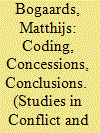| Srl | Item |
| 1 |
ID:
175581


|
|
|
| 2 |
ID:
165175


|
|
|
|
|
| Summary/Abstract |
In the past decades, New Institutionalism in political science has rekindled an interest in the role of institutions and has theorized the interaction between formal and informal institutions. Unfortunately, little of this has made its way into the consociational literature. This article brings together the two bodies of work, focusing on the case of Lebanon because it allows for a unique analysis over time of the different ways in which consociational features have been institutionalized. The National Pact of 1943 was a gentleman’s agreement between the political leaders of the two main religious communities. It formed the basis of a consociational system that lasted for decades. After the civil war, the Taif Agreement reintroduced consociationalism, but this time more institutions were constitutionalized. However, it would be mistaken to view this as a simple contrast between informal (pre–civil war) versus formal (post–civil war) consociationalism, because even today the most important consociational institution is informal. This article traces the development and interaction of informal and formal consociational institutions in Lebanon. In doing so, it contributes not only to the consociational literature and the debate about the merits of liberal versus corporate consociations, but also to New Institutionalism and questions about the relative strength of formal versus informal institutions.
|
|
|
|
|
|
|
|
|
|
|
|
|
|
|
|
| 3 |
ID:
175579


|
|
|
|
|
| Summary/Abstract |
Can inclusive institutions tame the threat of domestic terrorism? In a series of recent publications, the political scientists Arend Lijphart and Matt Qvortrup claim that consensus democracies are not only kinder and gentler, but also safer: consensus democracies are less likely to experience deadly domestic terrorism and when they do, they suffer fewer fatalities than majoritarian democracies. This article reexamines the logic and the evidence. It argues that the underlying grievance theory of terrorism contains important gaps and that the statistical results are based on a problematic coding of cases and lack robustness. Lijphart and Qvortrup have opened up an important new line of inquiry, but their results do not withstand scrutiny.
|
|
|
|
|
|
|
|
|
|
|
|
|
|
|
|